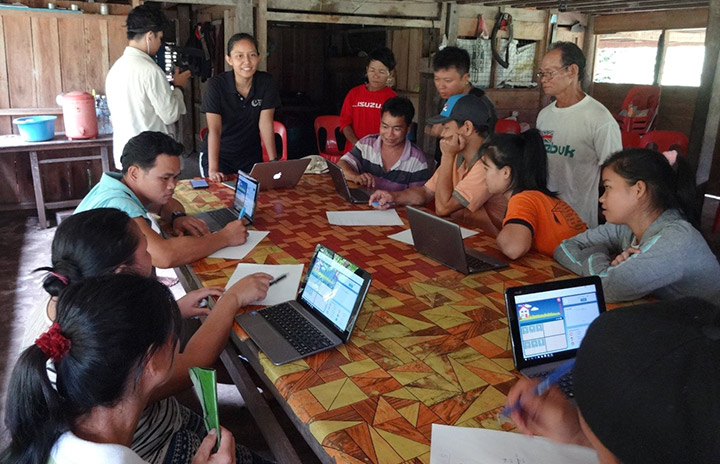Could you tell us more about Energy Action Partners? How did you decide on a focus on training and capacity building?
My two colleagues and I co-founded Energy Action Partners in 2014 after years of working in energy access and conducting research on community mini–grids.
We’re a nonprofit organization that focuses on collaborative and participatory energy access to foster resilient and inclusive communities. We believe that leveraging local capacities and enabling communities to collaborate with mini-grid providers and lead the development of their own systems results in better designed and more sustainable mini-grids.
Prior to Energy Action Partners, we had visited countless community energy projects and found that many mini–grids failed to truly meet community needs, resulting in limited social and economic benefits, and at times broken down and abandoned infrastructure. Mini–grid projects tend to under-emphasize community involvement and participation, prioritizing infrastructure provision instead. This generally leads to unmet expectations, poor cost recovery, and overall weak management of the mini–grid system.
However, substantive community engagement can be challenging due to the technical and financial complexities of a mini–grid. This is an issue our organization is trying to address by focusing on developing flexible and adaptable tools and methods that can help bridge the gap between communities and mini-grids developers.
How can the “Minigrid Game” be used in a community and how can a community benefit from it?
The Minigrid Game is a game-based energy planning tool in the form of a mini-grids simulation. In the game, players ‘play’ out their energy consumption by purchasing appliances and operating them, while managing an energy budget to ensure they can afford individual household consumption as well as system costs. A facilitator acts as the system operator and guides the players through discussions to collaboratively build and operate a mini–grid that serves their needs. The game is deployed on networked, digital devices, which makes it easy to deploy in remote communities. We run participatory workshops where we play the Minigrid Game with community members using an inclusive process that facilitates consensus building around different mini-grids issues. We have developed a number of workshop modules on topics such as developing and understanding current and future load profiles, tariff setting, demand side management, and productive end use. The simulation allows community members to experience and observe the results of their decisions, while the game format enables addressing more sensitive issues such as electricity theft and conflict resolution, both of which are not possible with current conventional approaches to community engagement (such as questionnaires and surveys).
The Minigrid Game communities have reported improved understanding of their own energy consumption and associated costs, greater knowledge of mini-grids operations, management, and economics, as well as stronger governance over their energy resources using existing local institutions and values.

Can this work be replicated in other geographies?
Absolutely! The Minigrid Game software tool is extremely flexible and accommodates different languages, currencies and energy technologies. Its user interface is mostly graphical in order to make it intuitive for users with less experience with computers and devices.
We have also designed the Minigrid Game process to include pre-gaming social mapping activities that provides facilitators with a basic understanding of the local community and energy context. The workshop modules are adaptable, and knowledge of the community allows the facilitator to better guide discussions within the modules, taking into consideration community-specific issues and leverages local norms and institutions.
To date, the Minigrid Game approach has been deployed in nine communities in Myanmar and Malaysia, but we have received requests from mini-grids practitioners and developers to use the Minigrid Game in other parts of Southeast Asia, South Asia and East Africa. We are confident that our tool and process can be adapted and used in other cultures and contexts.
What are some of the outcomes of the Minigrid Game? Have you seen any direct impact on the communities or other stakeholders on this?
The Minigrid Game is designed to radically change the role of communities in mini-grids, and the dynamic between mini-grids developers and the community. We have seen both these outcomes with our deployments.
For example, in early 2019 we ran a Minigrid Game workshop with a micro-hydro community in Malaysian Borneo that was experiencing reduced generation capacity and needed some demand side management solutions. We were halfway through the workshop when the village micro-hydro committee began to take over and lead the discussions themselves. By the end of it they had taken things completely into their own hands. Our team of facilitators gladly stepped back, continued to provide Minigrid Game technical support and watched them use the game to raise questions with each other and explore solutions that were agreeable to all. Afterwards, they reported not only an increase in understanding of micro-hydro operations, but also higher confidence levels to follow through with their solutions.
Are there other stakeholders you’d like to engage with in the mini-grids space?
Other than communities and mini-grids developers interested in using the Minigrid Game, we would like to engage with international development agencies and country-level and international mini-grids initiatives and programs to advocate for more community-centered approaches to mini-grids.
For any inquires about The Minigrid Game, please contact Ms. Ayu Abdullah: [email protected]

